 Petzlover
Petzlover Mioritic Sheepdog is originated from Romania but Newfoundland Dog is originated from Canada. Both Mioritic Sheepdog and Newfoundland Dog are having almost same height. Mioritic Sheepdog may weigh 20 kg / 44 pounds lesser than Newfoundland Dog. Mioritic Sheepdog may live 4 years more than Newfoundland Dog. Mioritic Sheepdog may have less litter size than Newfoundland Dog. Both Mioritic Sheepdog and Newfoundland Dog requires Moderate Maintenance.
Mioritic Sheepdog is originated from Romania but Newfoundland Dog is originated from Canada. Both Mioritic Sheepdog and Newfoundland Dog are having almost same height. Mioritic Sheepdog may weigh 20 kg / 44 pounds lesser than Newfoundland Dog. Mioritic Sheepdog may live 4 years more than Newfoundland Dog. Mioritic Sheepdog may have less litter size than Newfoundland Dog. Both Mioritic Sheepdog and Newfoundland Dog requires Moderate Maintenance.
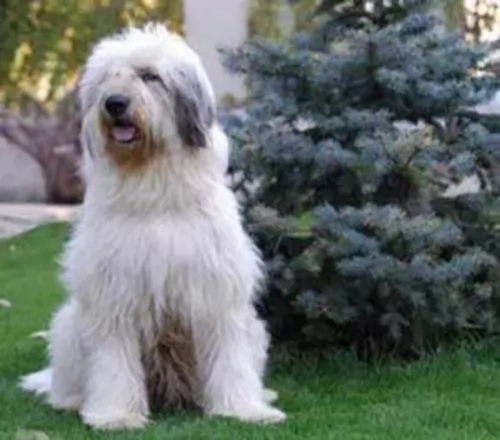 This is a large dog coming from the Carpathian mountain area of Romania.
This is a large dog coming from the Carpathian mountain area of Romania.
He has always been an excellent working dog, guarding and protecting sheep. Farmers always kept these dogs as working dogs, with no written records being kept about the development of the breed.
The breed is ancient, possibly dating back to ancient Roman times. It was in the 20th century that interest in the breed was ignited, and in 1981 the first official breed standard was recorded. The breed was also registered with the Federation Cynologique Internationale in 2005.
 The Newfoundland dog is a large working dog. They were bred and used as a working dog for fishermen in the Dominion of Newfoundland, an eastern province of Canada. With their web feet they were also used for water rescue.
The Newfoundland dog is a large working dog. They were bred and used as a working dog for fishermen in the Dominion of Newfoundland, an eastern province of Canada. With their web feet they were also used for water rescue.
The history of the Newfoundland Dog is unsure, but the breed as we know it today originated from dogs which were brought from Newfoundland to England in the early 1800's.
The Newfoundland Club was founded in 1886 so as to promote the breed.
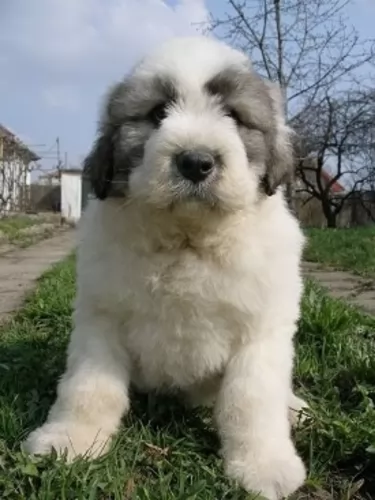 The Mioritic Sheepdog looks very much like the Old English Sheepdog with his huge body covered with long hair.
The Mioritic Sheepdog looks very much like the Old English Sheepdog with his huge body covered with long hair.
His head is also large with a black nose and smallish to medium length floppy ears. The color of the double coat is usually white, cream or pale gray, and sometimes you will find patches of these colors.
The tail has always been traditionally docked, otherwise the tail is left long with a slight curl at the end. The height of the dog is 65 to 75cm and he weighs roughly 50–60kg. Below the thick coat is a muscular dog with strong, straight legs which can help him become quite agile and speedy when needed. Allowed to breed, they can produce anything from 3 to 9 of the most adorable looking puppies.
The Mioritic Sheepdog is a balanced dog, loving to be with his owners but being wary of strangers. He is a brave dog, willing to guard his human family with his life.
He is also a strong-willed and dominant so it will be to his benefit to be trained and socialized so that he becomes obedient and easy to have around.Training won’t be difficult as he is an intelligent breed and already naturally obedient.
He is an energetic dog too so he will need to have regular exercise and games. He therefore gets on well with children in the home, loving to join in with all their games. He will need to be supervised around small children just because of his cumbersome, large size.
 The Newfoundland is a large dog standing at between 63cm to 74cm, both male and female. Weight can vary from 45kg to 80kg.
The Newfoundland is a large dog standing at between 63cm to 74cm, both male and female. Weight can vary from 45kg to 80kg.
He has a double coat of medium-length straight hair and the hair can be black, brown or gray. Although it is common for the Newfoundland to have a solid-colored coats, you will sometimes find small patches of white on their chest, toes, or at the tip of the tail. Then again you get the less common Newfoundlands where the coat is white with some black markings and these are known as Landseers.
The outer coat is coarse, oily and water-resistant quality, suited to a dog that loves to spend time in the water. The head is broad and large with small ears that he keeps lying close to his head. The tail is long and plumed and the feet are wide with webbing between the toes which aids him with swimming.
As with many large dogs, the Newfoundland is docile and his sheer size makes it that he is best suited to life in the countryside as opposed to living in the city. This is also because this particular dog wants to be close to water where he can swim.
He is a trustworthy, loyal dog and will get on well with children and pets in the home. Training and socialization is always recommended for any dog, but a big dog can often ‘get in the way’ indoors and you want him to lie down or sit when you tell him to. He is an intelligent dog so will respond well to training.
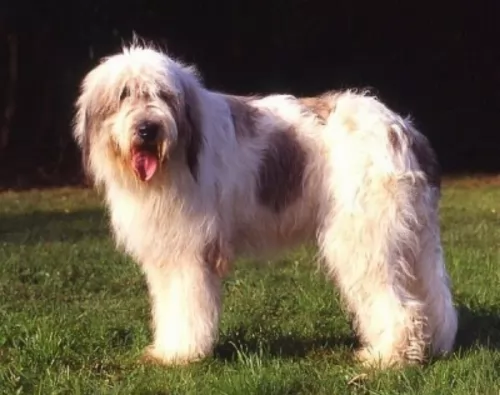 The Mioritic Shepherd has always been used to guard and protect livestock, but even though he has always taken this role seriously, he is calm and loving around his human family, making a splendid family pet.
The Mioritic Shepherd has always been used to guard and protect livestock, but even though he has always taken this role seriously, he is calm and loving around his human family, making a splendid family pet.
He also plays the role of guardian and protector of his human family seriously. He is a big strong dog and training and socialization will become necessary as he can become aggressive with certain people who he doesn’t trust.
Inviting one of these dogs into your home will ensure having a constant and loving companion at your side.
 Your beautiful, cuddly puppy will soon become a giant dog with a big appetite. Don’t just buy a cute puppy if you can’t afford to feed him properly and you can’t give him lots of attention.
Your beautiful, cuddly puppy will soon become a giant dog with a big appetite. Don’t just buy a cute puppy if you can’t afford to feed him properly and you can’t give him lots of attention.
Your dog will also be shedding, so be aware of these aspects before you bring a large Newfoundland into your home. He is a gentle dog, but his size could be worrisome if he isn’t trained, socialized and supervised.
Newfoundlands are amicable dogs, and while he may like to spend times indoors with you relaxing, he is a working dog and will require exercise and activities for mind and body.
Give this giant of a dog a loving home, and you will have a special, devoted friend like no other.
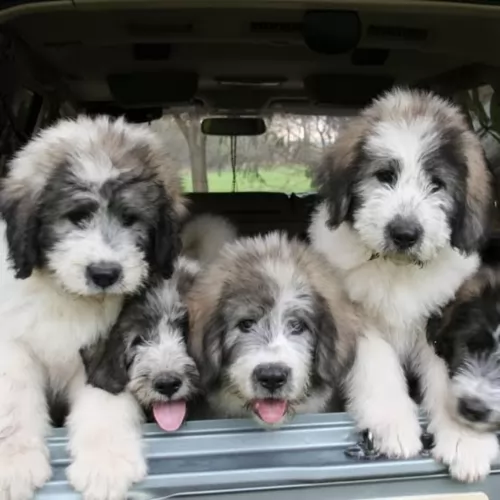 The Romanian Mioritic Shepherd Dog is a truly hardy dog breed and with good care such as good food and exercise can reach 14 years of age.
The Romanian Mioritic Shepherd Dog is a truly hardy dog breed and with good care such as good food and exercise can reach 14 years of age.
There are always some common dog illnesses to look out for and because he is a large dog, hip dysplasia can be a problem.
This is a disease where there is abnormal growth of the hip joints. Smooth movement of the joint is hindered and this leads to inflammation and pain.
At first you may find your dog limping and then you may find that after lying down, he battles to get up again. The joint becomes thickened with less mobility and the dog is reluctant to play like he used to. He will certainly need to get to the vet for treatments to make him more comfortable.
 The Newfoundland can be prone to serious health conditions such as hip dysplasia and gastric torsion. Deep chested dog breeds like the New Foundland are susceptible to bloat, a life threatening condition where the stomach swells, it can twist and the dog can die if help isn’t available. He will be salivating, restless and whining while also trying to vomit.
The Newfoundland can be prone to serious health conditions such as hip dysplasia and gastric torsion. Deep chested dog breeds like the New Foundland are susceptible to bloat, a life threatening condition where the stomach swells, it can twist and the dog can die if help isn’t available. He will be salivating, restless and whining while also trying to vomit.
Giant breeds are also prone to elbow and hip dysplasia, a genetic problem which can ultimately affect your dog’s mobility.
When in any doubt about your pet’s health, get him to the vet.
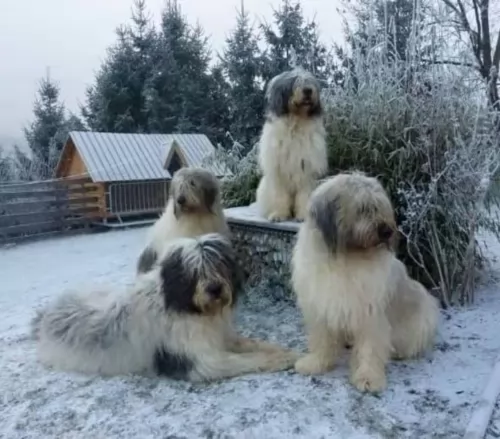 The Mioritic Sheepdog’s long hair is coarse and will need to be regularly brushed to keep it free of tangles. It will certainly need to be brushed 2 or 3 times a week, while some owners of this dog will prefer to have the coat professionally clipped. Because of the long hair, while brushing him it is an excellent time to check for ticks and fleas.
The Mioritic Sheepdog’s long hair is coarse and will need to be regularly brushed to keep it free of tangles. It will certainly need to be brushed 2 or 3 times a week, while some owners of this dog will prefer to have the coat professionally clipped. Because of the long hair, while brushing him it is an excellent time to check for ticks and fleas.
The food you give your pet plays such a critical role in his health and longevity. Always make sure that you’re giving your pet an uncomplicated diet to avoid stomach upsets.
Give him the best commercially manufactured kibble. To provide him with some variety, add in some boiled chicken, cooked vegetables such as potato, carrots and spinach to his kibble from time to time. He will also benefit greatly from having some raw meat added into the kibble occasionally.
Learn to know which human foods are totally toxic to him and avoid these. Make sure he is never without cool, fresh water.
 Your dog’s coat will need to be brushed at least twice a week as he is a heavy shedder.
Your dog’s coat will need to be brushed at least twice a week as he is a heavy shedder.
Do the nails of your dog as soon as they start getting long. Long nails can hook on things and cause injury to the dog’s paw area.
This is a dog with floppy ears so check inside the ears to prevent ear infections, more so because this is a water-loving dog. The dampness inside the ears can cause bacteria.
This is a giant breed and sadly, they have the shortest lifespans. You want to make sure that you keep your giant breed as healthy as possible to ensure he reaches the 10 or so years allotted to him and to also prevent health problems.
Make sure your giant breed puppy and adult has the very highest quality commercially manufactured food to ensure he gets the right balance of nutrients in. This food also makes sure that your puppy rather grows at a slower rate and stronger as opposed to growing too quickly. Rapid growth comes with joint problems.
All dogs, large and small, don’t want exotic, strange food that upsets their stomachs. They want consistency and simplicity and they want tasty food. Give him some homemade food such as cooked chicken, brown rice or pasta and some vegetables such as sweet potato, carrots and spinach. You can add this occasionally to his dry kibble.
Add in some raw meat from time to time too. Your pet will be strong, healthy, happy and content.